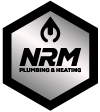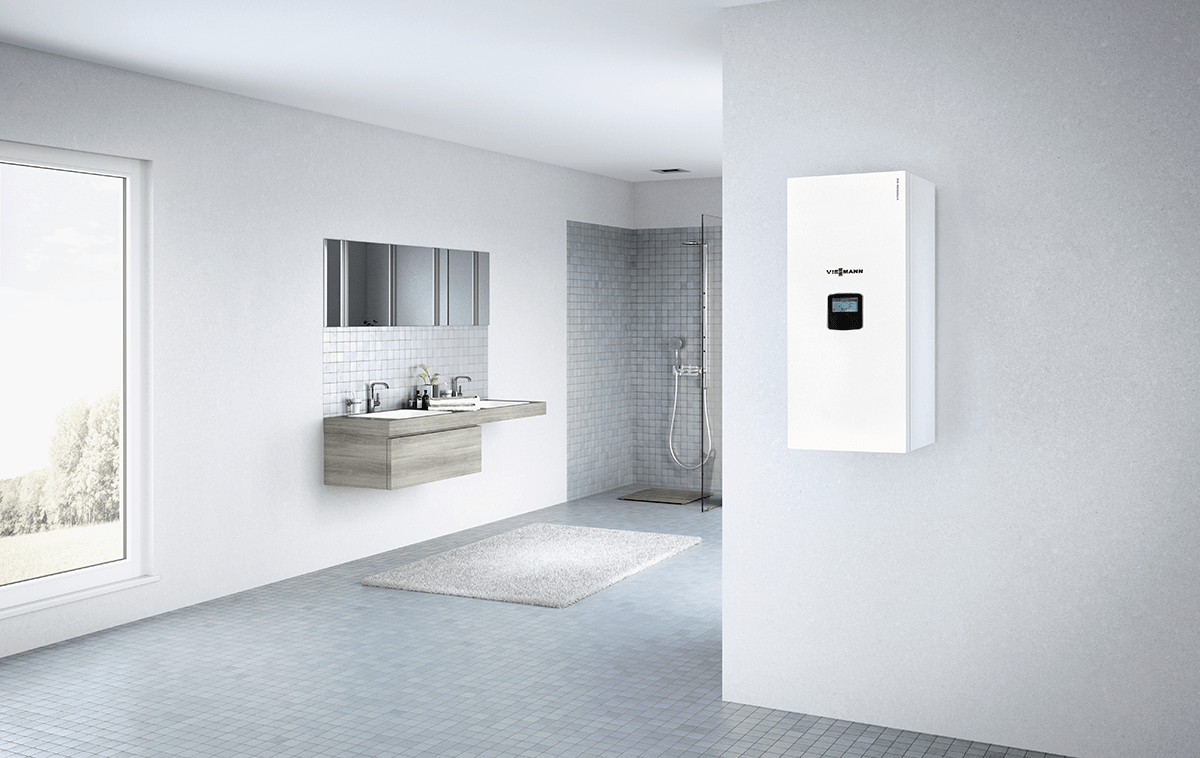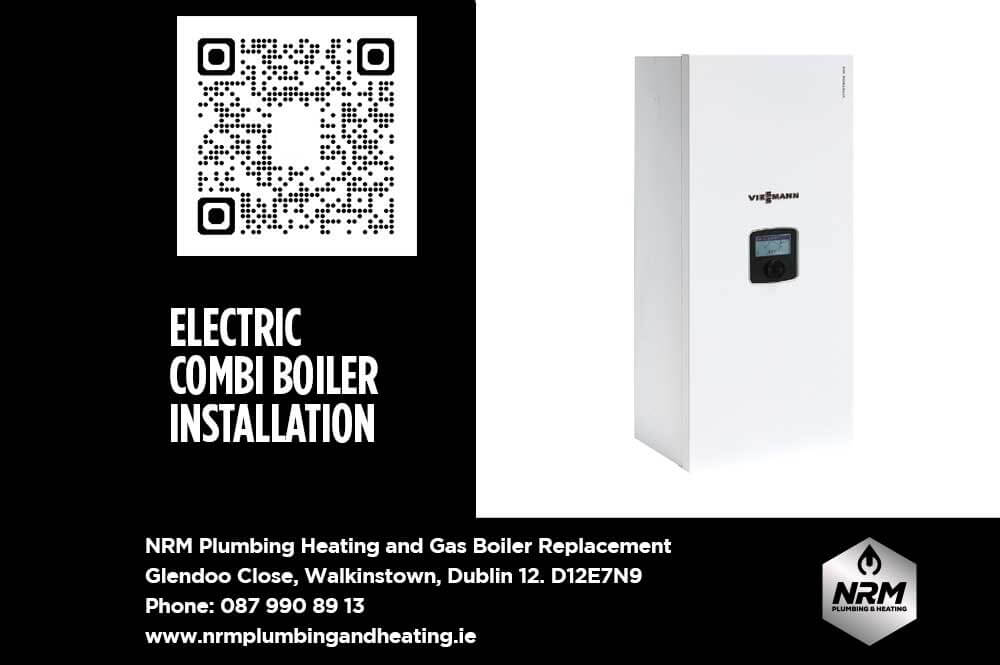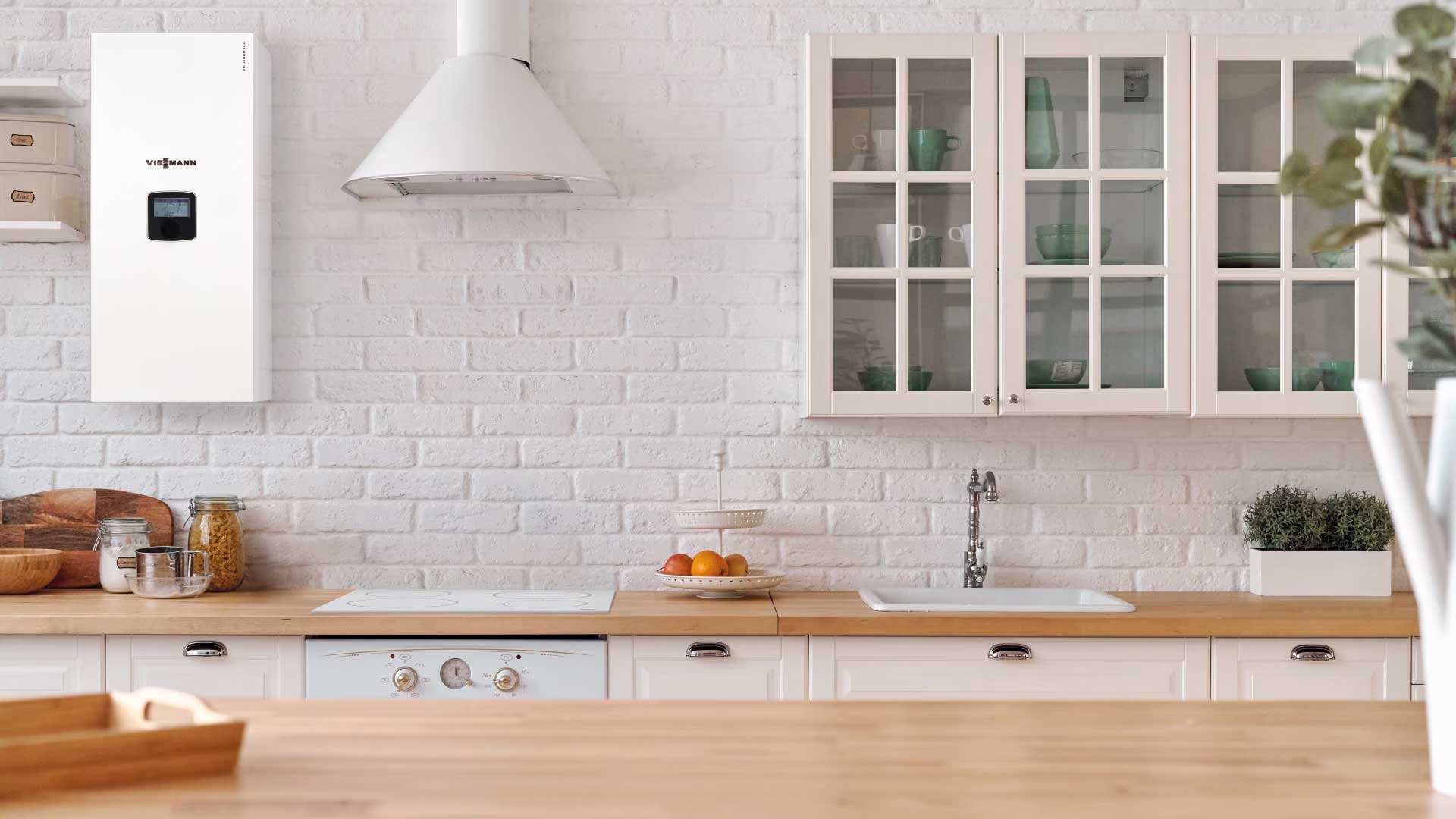Image credit: https://www.viessmann.co.uk/ ; Electric combi boiler installation – The transition of Ireland toward sustainable heating alternatives has made electric combi boilers an attractive choice for many homeowners. Many people avoid electric boiler systems because of various misconceptions about these systems. Our NRM Plumbing Heating and Gas Boiler Replacement team encounters numerous homeowners who remain puzzled by conflicting information about electric boilers.
The changing energy market combined with increasing environmental awareness makes it essential to know accurate information about electric combi boilers because it can help you save money and reduce hassle. The following discussion will separate fact from fiction regarding electric combi boilers for people who are renovating their homes or building new properties or seeking alternatives to gas and oil heating systems.
Myth 1: Electric Combi Boilers Are Always More Expensive to Run
The assumption that electric boilers are more expensive to operate than gas systems does not hold up when the full context is considered. While electricity may cost more per unit than gas, total operating expenses are influenced by multiple factors:
A well-insulated house needs less heating energy regardless of its heating system type. Smart programming can effectively minimise power usage patterns. Electric boilers transform electricity into heat with near perfect efficiency because they lose less than 1% of energy in the process while gas boilers discard 5-10% of energy through combustion and flue losses. Economy electricity tariffs allow cost-conscious consumers to achieve significant savings. Electric heating systems are particularly well-suited for smaller properties.
Electric combi boilers can lead to cost savings for homeowners who own smaller well-insulated properties. The key to success lies in selecting the appropriate boiler system which matches the unique characteristics of individual homes and their usage patterns.
The yearly operating expenses for an electric boiler in a typical Dublin three-bedroom semi-detached house may be:
-
Electric Boiler Costs: The average annual electricity consumption for such a house is approximately 4,200 kWh, which corresponds to an estimated cost of €1,270–€1,752, depending on the electricity tariff. This range accounts for standard tariffs and discounted plans.
-
Gas Heating Costs: The average annual gas consumption is around 11,000 kWh, with costs ranging from €1,175–€1,578 based on current gas prices and tariffs
The cost difference between electric and gas heating narrows when factoring in the lower installation and maintenance expenses of electric systems. Additionally, homes utilising economy electricity tariffs and solar panels can achieve running costs comparable to, or even lower than, those of gas heating systems.
As Ireland continues to expand its use of renewable energy sources, electricity prices are expected to stabilise or decrease relative to fossil fuels. This shift could result in electric heating running costs equaling or surpassing the affordability of gas systems in the coming years.
Myth 2: Electric Combi Boilers Can’t Meet High Heating and Hot Water Demands
The idea that electric boilers had problems with high demands was true in the past, but current systems have undergone significant changes. Electric combis in the market today can handle large demands because they come with power outputs between 4kW and 15kW and beyond.
The essential factor for success depends on accurate calculations of:
- Number of radiators and bathrooms
- Typical simultaneous hot water usage
- Home insulation quality
- Total heated floor area
A correctly installed 12kW electric combi-boiler system can easily provide heating and hot water for showering needs in a typical three-bedroom house. The direct water heating function of these systems provides better performance than some systems because it delivers hot water instantly without requiring preheating of big water volumes.
Electric combis function perfectly well for typical modern houses. The correct boiler sizing stands as the most important factor since any boiler size will fail to perform, regardless of its fuel source.
We would suggest a system boiler with a hot water cylinder for properties that need high water demand due to multiple bathrooms used at once because this advice works for gas systems as well.
Myth 3: Installation Is Complicated and Expensive
Electric boilers typically require simpler installation than gas systems even though some people fear complex electrical upgrades and high installation expenses. Electric models differ from gas boilers because they:
- Require no gas certification
- Need no flue or ventilation systems
- The absence of combustion risks enables users to place these systems anywhere they want
- Skip gas connection fees
- Typically occupy less space
The complexity of installation depends mainly on the current electrical conditions of your home. The majority of contemporary homes already have adequate infrastructure yet some older properties require updates to support power demands.
A basic system replacement will cost between €1,500 and €3000 when including parts together with labour expenses. The conversion process from gas to electric power systems typically costs between €2,000 and €400 because it involves gas system removal and possible electrical system modifications.
Electric boilers require less maintenance than combustion alternatives which leads to annual service cost savings between €100-150.
Myth 4: Electric Combi Boilers Are Not as Efficient as Gas Boilers
The common confusion between efficiency and running costs often contributes to this misconception. Electric boilers exhibit superior energy conversion efficiency compared to gas systems, thanks to fundamental physical principles.
The efficiency of electric models reaches nearly 100% because the majority of electricity transforms into heat. The maximum efficiency of premium condensing gas boilers reaches 90-95% because combustion and flue losses prevent higher achievement.
Electric boiler efficiency encompasses both instantaneous energy conversion and long-term operational performance, with precise temperature control and system design playing pivotal roles in optimising real-world effectiveness..
Electric boilers become progressively environmentally friendly as Ireland increases its electrical grid capacity with renewable energy sources. Electric models become greener with time because they produce no operational carbon emissions, while the grid becomes cleaner, thus making them more sustainable for the future.
Myth 5: Electric Boiler Technology Isn’t Reliable or Advanced
People view electric boilers as basic heating systems yet they are far from the modern technology that exists today. Viessmann Electric boilers produced today include advanced features which frequently outperform traditional gas heating systems:
- Output modulation matching exact heating needs
- Smartphone-controlled smart systems
- Weather compensation technology
- Self-diagnostic capabilities
- Home automation integration
- Renewable energy compatibility
- Whisper-quiet operation
The typical manufacturer warranty for electric boilers lasts between 2 to 5 years with possible extension options. The basic design of electric boilers which contains fewer components and no combustion elements leads to better reliability and extended operating times.
Choosing the Right Electric Combi Boiler
Selecting the optimal electric boiler requires considering:
1. Heating Requirements Assess property size, insulation quality, radiator count, and typical hot water usage. A standard three-bedroom semi usually needs 9-12kW, while apartments might require only 6-9kW.
2. Electrical Infrastructure Evaluate your consumer unit capacity, available supply, and potential peak loads. A thorough electrical assessment prevents installation surprises and ensures safety.
3. Future-Proofing Options Look for solar PV compatibility, smart control integration, and expansion capability.
4. Budget Realistically Consider purchase costs (€2000-€3,500), installation (€1000-€2000), running expenses based on your usage, maintenance savings, and available incentives.
5. Choose Experienced Installers: Select professional heating engineers, such as NRM Plumbing and Heating, with specific electric boiler expertise, comprehensive warranties, and positive reviews for electric installations.
The Future of Electric Combi Boilers in Ireland
The Climate Action Plan of Ireland works to decrease household heating pollution which drives up demand for electric alternatives. The absence of current gas boiler ban does not prevent policy directions from indicating a shift toward electrical solutions.
Electric boilers work well with renewable electricity sources because solar PV systems can directly power them and wind energy expansion makes the grid cleaner. The combination of battery storage systems creates an improved synergy.
The performance of electric boilers continues to improve due to the advancements in heating elements and flow technologies and control algorithms.
The SEAI provides limited electric boiler grants but offers multiple programs for cleaner heating transitions that become more effective with efficiency improvements.
The current electric combi boiler technology provides efficient and reliable heating solutions for numerous homes across Ireland. These heating solutions should be seriously evaluated by property owners despite their limited application range.
Electric models convert energy with nearly perfect efficiency which surpasses gas alternatives in conversion rates. These systems provide adequate heating and hot water solutions for most typical property sizes. The installation process tends to be easier than gas systems but some homes need electrical system upgrades. Modern electric boilers use advanced technology, which includes smart functionality.
The path toward sustainability in Ireland will make electric heating systems more widely adopted. You can decide if an electric combi suits your situation by basing your choice on factual information instead of misconceptions.
Reach out to NRM Plumbing Heating and Gas Boiler Replacement for a professional evaluation of your property’s compatibility with electric combi boilers.






Leave A Comment